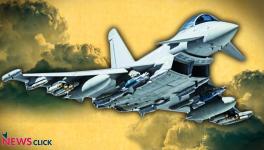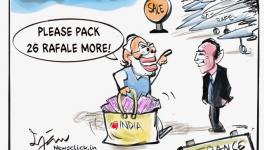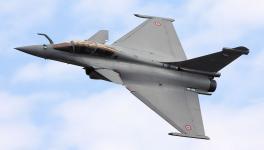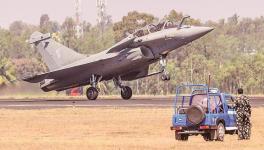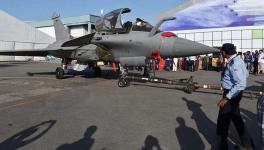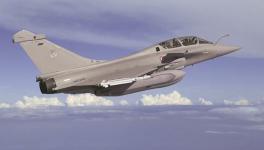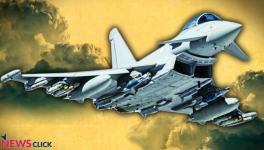Rafale Jet Deal Doesn't Comply with 'Make in India' slogan.
Newsclick is republishing this interview in the light of final agreement on Rafale deal.
India and France signed a government-to-government agreement to purchase of two squadrons of the Rafale multi-role fighter aircraft, a massive cut down from the original plan to acquire 126 fighter planes. As a part of the original plan 18 of these fighters were to be handed over by 2015, with the rest being assembled or made locally. Instead, the rapidly rising cost of the aircraft forced the government last year to cancel the deal as unaffordable, and to decide on buying just two squadrons, without any condition for local assembly or manufacture.
In this context, Newsclick interviewed defense analyst D. Raghunandan. According to him, this deal doesn't add value to promote any indigenous development. The force has to depend on other fighters, leading to it managing and maintaining a fleet with planes from multiple manufacturers with low number of fights in each. Raghunandan said, the deal has been arrived mainly by the Prime minister and defense minister in such a way that all the stake holders in the previous plan was not correct including the Indian Air Force. He said, this kind of deal is not good for the country in long term.
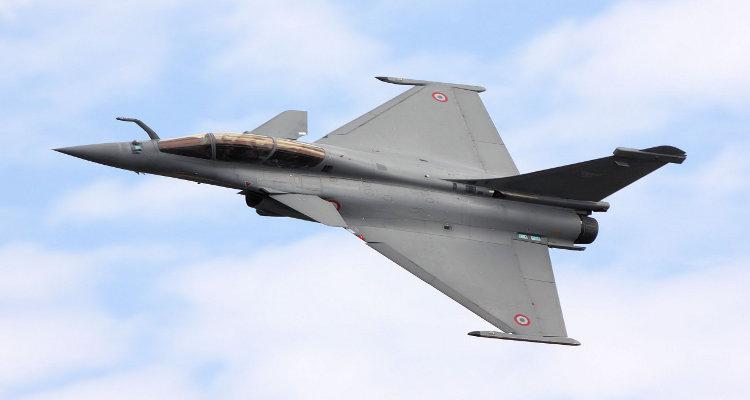
Image Courtesy: wikipedia.org
Rough Transcript
Pranjal: Hello and welcome to Newsclick. Today we have with us D. Raghunandan, a defense analyst. We are going to talk about the Rafale deal signed between India and France. Hello Raghu, welcome to Newsclick. So the way this deal has been signed and there’s been so much hype being created around it, how well has it been structured, how well has it been executed and is India going to benefit from it?
D. Raghunandan (Raghu): Let me say that when the deal was first talked about and struck at a 126 air craft, the situation has changed a lot. We are now talking about a very truncated deal with only 36 air craft being acquired and acquired in a fly way condition which means there’ll be very little of transfer of technology, or from the Indian point of view, acquisition of technology, very little scope for local manufacture of it. So all that India is going to get from this is going to be a few aircraft whereas the earlier idea was, get a substantial number of aircraft which the air force said they required and along with that to get technologies and a substantial portion of assembly or manufacture in this country so that there was a process of acquisition of technology as well. Now that’s not going to happen and if you ask me from a purely military point of view, I think we’re adding to the nightmare that our air force has become. Our air force is today is like a zoo, it’s got too many animals and too many different cages and it’s a nightmare for ground forces to maintain, service such a wide variety of air craft. If we’d had a 126 Rafales that’s a different matter altogether. Now you’ve got 30 odd Rafales, you’ve a few odd Mirages and a few odd xyz, this is not a way to structure an air force.
Pranjal: Yeah because even Manohar Parikar told that the way this 126 deal was signed when UPA-2 was in the government. So he said that that was not properly structured while this deal is properly structured and we’re thoroughly looking at it. So I mean can you throw some light on that, where does that come from?
Raghu: Frankly I don’t understand this at all because the defense procurement procedure worked out in India over many stages and involving multiple stakeholders in the government, in the finance sections of the government and the military all sitting together and working out a procedure by which you lay down your requirements of the user force, which is the air force then discussing the politics and the strategy and everything else that goes with it then doing an evaluation through a global tender from which you did a short-listing and then arrived at the final and the numbers were decided by all these people sitting together. So I don’t understand how a loan defense minister can suddenly turn up and say this was badly done. Does he mean all the service chiefs were wrong? Does he mean the entire bureaucracy was wrong? I don’t understand how anybody could arrive at that decision. If he wants to say, ‘I as defense minister have overturned that decision’, that’s a completely different matter but there was a procedure followed, the air force had stipulated its requirement for a 126 air craft for a variety of reasons which have not changed till now. Your Tejas is still not online, it’s not ready to come into force in the numbers required for the next five years at least. So that position remains the same. Your Su-30s are still along the same track as were there earlier and your rate of obsolescence of the MiG series has gathered momentum and is now five years down the line so you’re just a few years away from retiring your MiG feat so I really don’t understand what the chief minister, what the defense minister is saying, in fact it has turned the clock back to a period when extremely arbitrary decisions were taken by the political leadership at a whim or the drop of a hat whereas this time, whether you agree with it or not a fairly extended procedure was followed to arrive at this decision.
Pranjal: Raghu lot is being talked about the pricing of these jets, these planes so where do we stand in that term have you proposed a proper price because if we look at the cost of the jet, the planes which we are acquiring and the quantity, they don’t stand in, they’re not parallel to each other, there’s a contradictory difference between the two.
Raghu: I’m not so sure but one thing I’ll definitely say that if we are buying 36 air craft and we are not getting any special concession on numbers, if we have bought a 126 air craft we might have got them at a slightly cheaper cost in terms of unit price. But now the way the deal is structured the French are quoting reasons why the cost has gone up. Firstly of course we are about 6 years down the line from when the deal was first spoken about and when the price, initial price thing was done and Rafale was chosen over the Eurofighter on the basis of being what’s called L1, the lowest price bit from equivalent air craft. From that time its 6 years down the road but the unit price is really expensive right now, 230 odd million dollars per air craft that’s huge to pay. That’s first, second thing is that I believe that the Indian side has put certain additional conditions in the 6 years since then the air force wants A,B,C and D done in the aircraft. So it’s not going into a shop and buying a readymade air craft. There has to be special things done to it. Egypt has just bought two air craft total fly a ways, just picked it off the shelf. If it’d been that we could’ve pushed harder for a lower price. But these niceties apart, I believe there are some structural reasons why India has got itself into a position where the price is high. Firstly I think for all the complex defense procurement procedures that we have evolved there is something fundamentally flawed as far as the pricing is concerned. You take a decision on the basis of a variety of considerations including a first quotation of a price then you decide the Rafale is the winner and then you start price negotiations. Now this I don’t understand, if you’re in the process of a bargain and you tell the shopkeeper that I’ve decided this is what I want and then you say now let’s negotiate the price, he has no incentive to lower his price because India has tied itself in knots with this defense procedure and if you now change your mind and say we’ll go for L2 which is Eurofighter, people will throw up a stink and saying this is arbitrary, there is corruption involved and so on. So I find this structure particularly problematic in trying to negotiate for a price after you’ve decided which air craft you’re going to buy. Price should be a key factor in your decision as to which air craft you’re going to buy and not follow after the decision and which is why today we are in trouble, the French know you’ve decided on the Rafale, you can’t go back so there’s no incentive on them to push down the price.
Pranjal: Yeah because even if you look at the prices which we are paying I mean it’s at the cost of other things that the defense could have acquired and which is required for other armies too.
Raghu: Yeah but that’s a different argument. Sticking just to this deal itself, there is in fact one very strong reason why we should be pushing for a lower cost and lower price and that is, the earlier price negotiated for 126 air craft also involved transfer of technology in which there is a price. Now, when you’re buying them fly a way, there is no transfer of technology so you should not be paying for that. So it can’t be less, it can’t be more than the price that has already been cited, it should be substantially less.
Pranjal: Major question is then why only Rafale? We could have bought other planes also in the similar cost and if we look at the transfer of technologies, that is also not taking place so a big question comes that why only Rafale? Or at that time when if you look at the various deals signed by the current BJP government in past one and a half years, in no such places the technology transfer is taking place actually. Its only you are buying, they are just giving it to us be it in the case of nuclear deal and now in the case of air crafts.
Raghu: There’s two aspects that you raised and I’ll answer them separately. The first is, why the Rafale. As I said, the Rafale was selected after a competitive process where there were four air craft being initially offered, India floated a global request for proposals, requests came in and out of the four, two American contenders were rejected, the Swedish contender was rejected that left the two which seemed to suit the air force’s requirements, the Eurofighter and the Rafale were selected and after extensive actual flying trials by the air force they decided the Rafale. Now it’ll be very difficult for us to sit here and question the air force’s judgment and requirement as to which air craft suited there. One really unless there are very strong reasons to oppose it, one really needs to go along with that decision unless there are strong reasons. The only thing I will say is, I believe that even the air force and everybody else put together has not taken a sufficiently long term perspective in deciding on the Rafale. For instance, India in terms of a small interceptor role fighter air craft, if MiG21s are going out does not have a substitute and we are using far more larger and more expensive air craft for what should be a fairly simpler role. If you look at the long term therefore you’re looking at an air force structured around a small fighter, which could be the MiG but MiG is now being superseded by the Tejas and then you have a set of air craft in between which you use for ground attack and for interception where you’ve got the Su-30. You really were looking for a air craft in between these two. The delay in the Tejas has caused a problem there and looking a further at long term you’re looking at the Indo-Russian joint venture, the fifth generation air craft. Rafale is sort of neither fish nor fowl, if you really took a long view there are not too many reasons why the Su-30 could not do this provided of course you had the Tejas to do the other roles and this. So, there was a bit of panic reaction in the air force because of dwindling strength, not having enough air craft, the Mirages getting degraded so you are left with a situation where you wanted more air craft and you didn’t have them and therefore you went in for this deal, there was a push. Those circumstances behind the push unfortunately continue today but the second point you rightly posed is, if you’re going to buy just outright buy and not acquire technology then I don’t see what India is gaining. With Su-30 you’d already acquiring the technology, you have a technology transfer agreement in place you could’ve done that and if that is going to be an important part of the deal, maybe the Eurofighter deal may have been better because they were also offering technology transfer. The last part of your question is I believe the most crucial and that is ever since this government has come in now, they have been acquiring hardware. For all the talk of make in India, there is no acquisition of know how. In fact the make in India is a complete misnomer, its only assemble in India so and with the Rafale deal it’s not even going to be assemble in India with only 36 air craft there’s no assembling involved either. The big issue I believe, not the subject of today’s discussion maybe we could discuss this some other day is that India over the last 50 years and this is not today, yesterday has completely ignored and not done what is required to build up indigenous capability to design and make your own air craft. Now that is not a problem which can go and get resolved in one year or two years but this government has shown no signs of doing anything to reverse this trend and to restore. In fact if you go by this deal, they are doing everything the opposite just buying away and feeling happy at doing that, this is certainly not the way to go for any technology leave alone in defense where you need to be far more self reliant and have your own capability. Tomorrow at the time of if there is a conflict and you’re stuck with impotent air craft, how do you know you’re going to get spares or not going to get spares, what’s going to happen to them. This is not a happy condition for any country to be in.
Pranjal: Actually the self dependence needs to be developed and the Indian agencies need to be promoted according to that. Thanks a lot Raghu for giving us your time and as things proceed we’ll be coming back to you on such issues. Thanks for watching Newsclick.
DISCLAIMER: Please note that transcripts for Newsclick are typed from a recording of the program. Newsclick cannot guarantee their complete accuracy.
Get the latest reports & analysis with people's perspective on Protests, movements & deep analytical videos, discussions of the current affairs in your Telegram app. Subscribe to NewsClick's Telegram channel & get Real-Time updates on stories, as they get published on our website.










